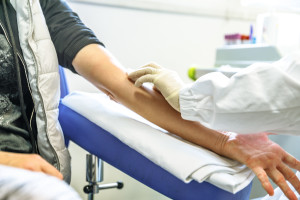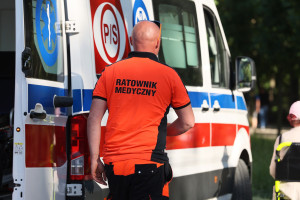The Ministry of Health is developing a new hotline. It will provide assistance to people with sexual preference disorders.

- The Ministry of Health is participating in the work of the Ministry of Justice on creating guidelines for the protection of minors, which are intended to ensure the safety of children, among others, in schools and clinics.
- The ministry is also working on launching a new hotline. It will provide support to people with sexual preference disorders.
- Experts support the idea, but point out that without a network of specialized centers, the initiative will fail.
- - We already have a problem with providing therapeutic and medical care to people who are subject to protective measures in the form of mandatory therapy - says Aleksandra Krasowska, psychiatrist and sexologist
Representatives of six ministries presented a report to the Members of the Committee on Children and Youth on the implementation of the National Plan for Counteracting Crimes Against Sexual Freedom and Morality Harmful to Minors for 2023-2026. Dagmara Korbasińska-Chwedczuk, director of the Public Health and Health Equity Departments, spoke during the meeting about the actions taken by the Ministry of Health in this regard.
"The Ministry of Health's responsibilities cover two areas. The first is the protection and care of individuals who have experienced sexual violence, and in this regard , guidelines have been developed by the national consultant in the field of child psychiatry. They are distributed to the medical community and indicate how to work with a child after such an experience," the official explained.
She also recalled that, regardless of this, the Ministry of Health has established a team to develop procedures and guidelines for dealing with survivors of sexual violence. "It aims to protect both children and anyone—regardless of gender and age—survivors of sexual violence who receive health care services. However, consideration is underway as to whether to dedicate a separate document specifically to children," Korbasińska-Chwedczuk said.
The Ministry of Health is also participating in the Ministry of Justice's work on developing guidelines for minor protection standards, which are intended to ensure the safety of children in various facilities, including preschools, schools, and clinics. A special working group in the health sector has been established to prepare guidelines for minor protection standards for primary health care facilities.
"The Ministry, as the entity overseeing a number of specialized healthcare providers, has provided information to its entities. We have also asked the inspection services operating within the Ministry of Health, the voivodes, and the National Health Fund to pay attention during inspections to the extent to which standards have been specified in each unit. We will further refine these standards and redirect them to primary healthcare, which, due to its specific nature, should be much more effective in identifying threats and supporting those at risk of sexual violence or those who have already experienced it," Korbasińska-Chwedczuk, who also chairs the aforementioned working group, explained during the commission meeting.
A new hotline will be established. It will provide support to people with sexual preference disorders.She also revealed that analytical work is underway at the Ministry of Health to prepare for the launch of a hotline for people experiencing sexual preference disorders who are seeking help and support.
"Launching such a line without referrals to multiple healthcare providers that could directly help those who come forward will be ineffective. Therefore, we are currently focusing primarily on strengthening the healthcare system in this area," emphasized the official reporting on the ministry's work.
The scope of work she outlined includes developing a health problem card, which is currently being evaluated. "This is a new health service that provides outpatient health care for perpetrators of violence, i.e., individuals who have already been convicted. Some of them are in forensic psychiatric centers, some of whom could already be discharged. They are adequately prepared for this, but upon returning home, they will need access to health support in this area, and we are preparing just such a service," assured the department director.
She also added that the Ministry of Health website includes a list of medical entities that are prepared to work with people requiring psychotherapeutic and pharmacological support in connection with their sexual preferences.
She also expressed hope that the inter-ministerial cooperation undertaken in the field of protection of minors will allow for the preparation of solutions that will, on the one hand, provide appropriate assistance to children experiencing sexual violence and, on the other hand, reduce the likelihood of paedophilic incidents.
"They need to have a place to go and specialists who can work with them"Aleksandra Krasowska, MD, PhD, a psychiatrist and sexologist, who attended the committee meeting, emphasized that she supports the idea of establishing a new hotline, but, as she pointed out, only education can be provided over the phone. "We need a network of centers to which these people can be referred," she said. "They need a specific therapist, a specific doctor who will examine them, assess their risk, and possibly prescribe medication," she explained.
"The support provided by the hotline is extremely important, but it cannot be a success in itself. This is just the beginning. We already have a problem arranging therapeutic and medical care for people who are subject to protective measures such as mandatory therapy," she pointed out.
She noted that only a few centers in Poland provide therapy for patients diagnosed with sexual preference disorders. "I'd like to illustrate the scale. We're dealing with people who leave prison with orders to undergo outpatient therapy. If we have three or four such centers across the country, it's unrealistic for these people to receive therapeutic interventions. It's simply impossible," she asserted.
She explained that if such patients had to travel far for therapy, they would not be able to keep their jobs, which would increase the risk of them reoffending.
The expert also admitted that many of the people currently referred to the national center for the prevention of dissocial behavior could be cared for on an outpatient basis, but they need a place to go and specialists who can work with them. "We also need centers that work according to the same therapeutic program," she argued.
Copyrighted material - reprint rules are specified in the regulations .
rynekzdrowia













